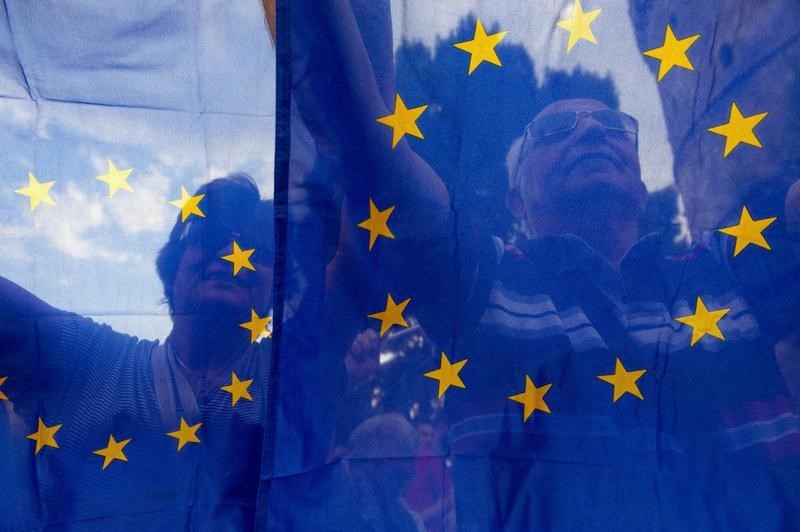(Bloomberg) -- Even though the European Union’s 750 billion-euro ($846 billion) coronavirus recovery package is facing stiff headwinds from budget hardliners, Germany believes an agreement can be reached quickly.
“Although there remain differences between various nations that are not small, I have the impression that everyone has the will to reach an agreement within a short time,” German Finance Minister Olaf Scholz said in a statement on Tuesday. “The starting positions are different, but as I said, a constructive spirit can be detected on all sides.”
Scholz spoke before he and his 26 EU counterparts debate for the first time a plan by the European Commission, the EU’s executive arm, that would make as much as 500 billion euros in grants and 250 billion euros in concessional loans available to the member states most affected by a pandemic-induced recession. The program, which needs to win the backing of every capital, would be funded by joint debt issuance in a significant step toward closer economic integration.
While EU leaders have agreed on the need for a fund to assist with the recovery and accept the proposal as a basis from which to start discussions, disagreements over key aspects of the plan loom large. Several countries have already raised issues with the blueprint, signaling heated negotiations in the weeks ahead as they seek to find common ground.
Governments including Austria, Denmark, the Netherlands and Sweden have all voiced opposition and are keen to ensure their taxpayers aren’t on the hook for future repayments.
In a letter to parliament, the Dutch government said the recovery fund’s size and distribution must be based on the actual impact of the coronavirus crisis. “It should be limited in time and financed on a loans-for-loans basis based on a clear repayment schedule,” the government said, adding that it’s “skeptical” of the commission’s proposal.
Austrian Finance Minister Gernot Bluemel said that while he supports the idea of a European recovery fund for targeted, one-time emergency support, his country would withhold approval until its size has been pared back and repayment details were made explicit.
“The overall package isn’t acceptable in its current form, both regarding its size and its content,” Bluemel said in a statement. He added that the proposal doesn’t say how the funds will be repaid, is based too much on non-repayable grants rather than loans, and doesn’t sufficiently tie them to conditions.
Bluemel and his counterparts from Denmark, Sweden and the Netherlands held a conference call with Scholz on Monday to explain their opposition. Scholz, when asked how the conversation went, said, “there were a lot of constructive signals.”
Grants, Loans
Among the key points of contention are the size of the fund as well as the mix between grants and loans. The plan’s main opponents prefer fewer grants and more loans and want to ensure sufficient strings are attached to the available funds. Another issue has to do with the criteria based on which aid will be allocated to different countries, something governments are expected to fight over in coming weeks.
“What’s most important is that when we look closer at it, much of the support in the recovery and resilience fund isn’t going to countries that are truly affected by the pandemic”, Swedish Finance Minister Magdalena Andersson said in an interview.
Another issue hawkish countries have brought up is bringing forward the repayment date for the funds the commission plans to raise on the markets to finance this effort. They would prefer an earlier date than the proposal’s 2028.
Denmark has already made indications that it’s softening its stance, with the government no longer opposing direct handouts, but now seeking to reduce the “subsidy element” of the fund, according to Danish broadcaster DR.
“It’s about us supporting nations with allocations of funds for very specific investments and helping them through an economic recovery,” Scholz said. “It’s very important for us that the funds are used to drive an economic recovery.”
(Updates with Dutch position in the sixth paragraph)
©2020 Bloomberg L.P.
